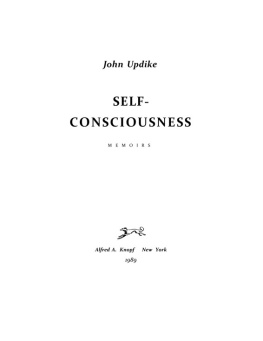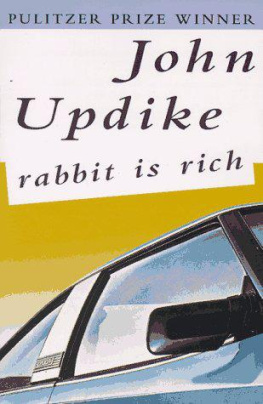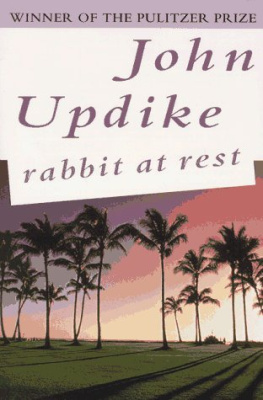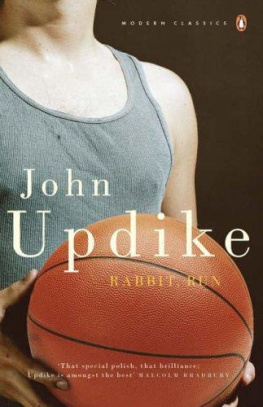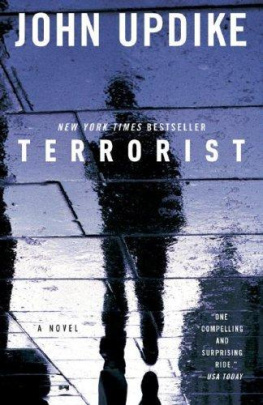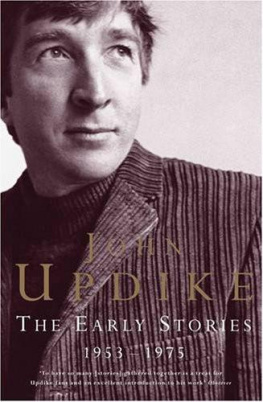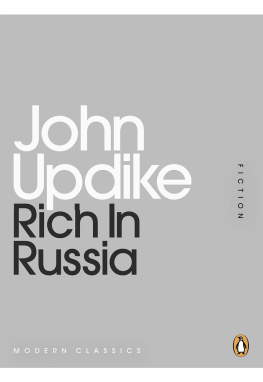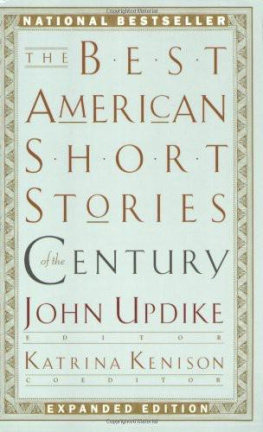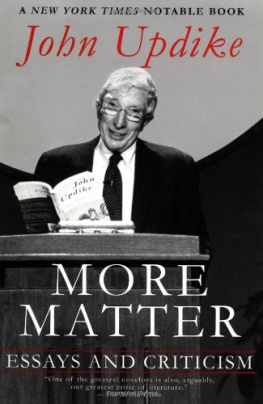
John Updike
SELF-
CONSCIOUSNESS
M E M O I R S
Alfred A. Knopf New York
1989
We are persuaded that a thread runs through all things: all worlds are strung on it, as beads: and men, and events, and life, come to us, only because of that thread.
Emerson, "Montaigne; or, The Skeptic"
I find myself saying briefly and prosaically that it is much more important to be oneself than anything else.
Virginia Woolf, "A Room of One's Own"
Of all that might be omitted in thinking, the worst was to omit your own being.
Saul Bellow, "What Kind of Day Did You Have?"
Gratia Dei sum quod sum.
epigraph of Bishop West of Ely, in Ely Cathedral
Contents
Foreword xi
i. A Soft Spring Night
in Shillington
HAD NOT my twenty-five-year-old daughter undertipped the airline porter in Boston, our luggage might have shown up on the carrousel in Allentown that April afternoon in 1980, and I would not have spent an evening walking the sidewalks of Shillington, Pennsylvania, searching for the meaning of my existence as once I had scanned those same sidewalks for lost pennies.
The idea of lost luggage has been flavored for me with the terrible, the void, ever since William Maxwell gently said to me on our first acquaintance, in 1954, when I, newly a Harvard graduate and New Yorker contributor, was about to embark for England with my slightly pregnant wife: "People think lost luggage is just like death. It isn't." The words were meant to be comforting, perhaps in response to some nervously expressed worry of my own; but they had an opposite, disquiet-ing effect. From early adolescence on, I had longed to get where now, for a brief interview, I was: inside Tbe NewYorker's offices. And almost the first words spoken to me, with a certain stoic gaiety that made clear I had definitely left behind
S E L F - C O N S C I O U S N E S S
mc the Christian precincts of Berks County, concerned death.
I was to lose my luggage a number of times in the peripatetic future ahead: in 1978 my folding suit bag vanished between Rome and Dubrovnik and I was obliged to parade through Yugoslavia, Greece, and Israel in the rumpled denim leisure suit meant to be my airplane pajamas, and was ridiculed for my sartorial gaucherie in the Jerusalem Post; in 1980, my big yellow suitcase was mistakenly grabbed by somebody from Long Island (I know because his similar suitcase then became, uselessly and infuriatingly, mine) in Kennedy Airport and so I had to visit the Yanomamo Indians in southern Venezuela wearing ill-fitting safari clothes borrowed from the American Ambassador. In Allentown, our two bags just weren't on the carrousel, though it went round and round, and at last there seemed nothing to do but turn away, with my daughter and my widowed mother, and drive the forty miles south to where my mother lived and, indeed, still lives, in a rural area called
embarrassingly, at least to mePlowville.
How circumstantial reality is! Facts are like the individual letters, with their spikes and loops and thorns, that make up words: eventually they hurt our eyes, and we long to take a bath, to rake the lawn, to look at the sea. Where was my wife?
Also on a family trip, in Florida, with her nine-year-old son by a former marriage. Why did I leave it to my daughter by a former marriage, the matured fruit of that slight pregnancy twenty-six years before, to check in at the airport? I was parking the car; we were in a rush, because we were late, in turn because since childhood I have been a late sleeper, preferring to let others get the world in order before I descend to ita mode of efficiency, actually, that seems the opposite. Why (if she did) did my daughter botch this small assignment? Because my first wife and I had raised our children to be innocents, being innocents ourselves and thinking it a nice aristocratic thing to be. Guilt at having left, after twenty-one years of
A Soft Spring Night in Shillington
marriage, this other innocent tinges my relations with my four children and makes for a lot of bumbling, of the lost-luggage sort.
In my mother's housean old sandstone farmhouse, the very one in which she was born in 1904, and which had been reacquired four decades later, in 1945, when the war had put a little money into our pockets and boldness into our hearts
the telephone rang, at six-thirty. A voice from Allentown, brightly female, with that flirtatious-seeming drag of a Pennsylvania accent which after all these years away still strikes me as exactly the right note, announced that the bags were at the airport; they had come in on the next flight.
We were just walking out the door. We had eaten an early supper and planned to see Being There, starring Peter Sellers as Chance, at the movie theatre in Shillington, eleven miles away. Rather than disappoint my two female companions and, furthermore, frustrate this third female, on whom our luggage weighed as heavily as a bad conscience and who was offering to bring it to us personally, I improvised this scheme: I, who had already seen Being There, would take my mother and daughter to the movie as planned, and then I would be there, under the movie marquee, waiting for the girl from the Allentown airport, with the two suitcases. Her boyfriend lived in the Reading area, she said, and would be driving her.
The plan was agreed to on all sides. The theatre location was described over the phone. The girl thought her boyfriend knew where it was anyway. Then the eleven miles to Shillington were navigated and my two kin were tucked into the movie theatre, which, on this drizzly Thursday night, had attracted no line. The last latecomer bought the last tardy ticket, and I stood alone beneath the marquee. The thinnest of mists drifted across the sulphurous streetlights of Lancaster Avenue and gave the passing tires an adhesive, plaintive sound.
The girl from Allentown couldn't be here for another hour at
S E L F - C O N S C I O U S N E S S
best. I had nothing to do, here at the center of my earthly being.
Dasein. The first mystery that confronts us is "Why me?"
The next is "Why here?" Shillington was my here. I had been born here, or, rather, been brought back to it from the Reading Hospital, which was located in West Reading. For thirteen years I had lived in the same house on Philadelphia Avenue, number 117. After moving eleven miles away, with my family's quixotic recapture of my mother's birthplace, I still returned to the town for school and social life. Shillington, I can see now, is a typical town of the region, of a piece with Kenhorst and Grille and West Reading and Mount Penn, which had once seemed remote and wildly different places. (An oddity of the area is that the towns call themselves boroughs; in my childhood the chief elected official bore the ancient title of burgess, where now there seems to be both a "mayor" and a
"borough manager.") The towns are snug, and red and green in tint. They began as "string-towns"a few farmhouses, with perhaps a tavern and a feed mill, strung along the road from, in Shillington's case, Reading to Lancaster. The houses were built first of sandstone or limestone and then of brick. The gaps between them gradually filled in (and are still filling in) and then tracts of open acreage back from the road succumbed to development, to rectilinear streets and close-packed rows of semi-detached brick dwellings on thin strips of land that back onto an alley. Garages line the alleys; porches and retaining walls line the streets. The streets are high-crowned and drain well. My grandfather, when his fortunes took a disagreeable turn after his moving to Shillington in the Twenties, joined the town work crews that laid out much of the tidy section north of Lancaster Avenue called Speedway, on the site of an old race track.
Next page
